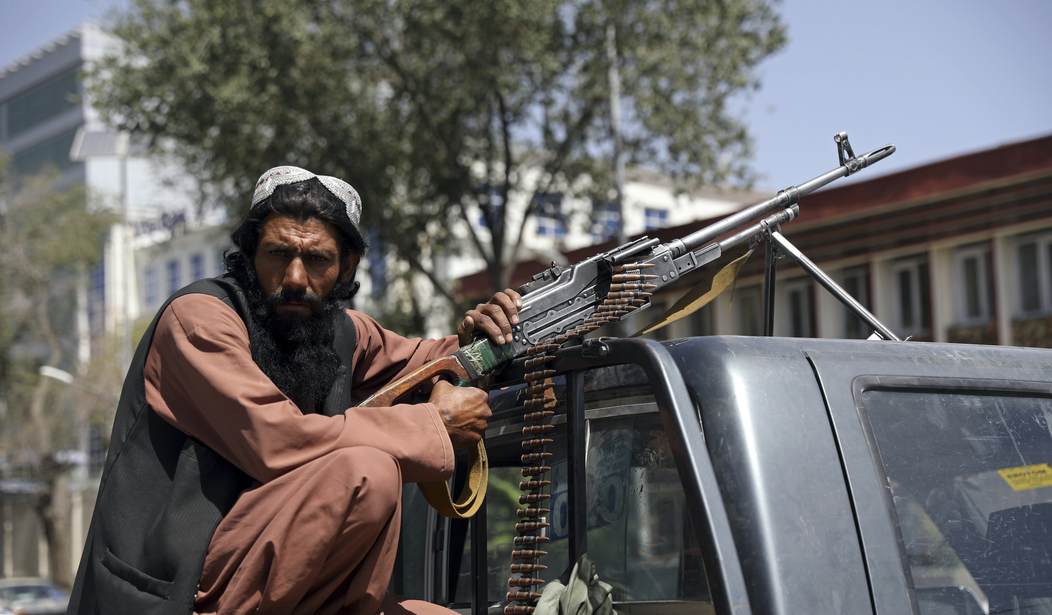At 9:05 Monday night, State Department spokesman Ned Price issued a plaintive message to the new rulers of Afghanistan. "The Taliban needs to meet its commitments and obligations in Afghanistan," Price tweeted. Those commitments and obligations include respecting freedom of travel, safeguarding the "basic rights of the people," engaging in counterterrorism, "not carrying out reprisal violence against those who stayed" in Afghanistan and "forming an inclusive government."
Who is Price kidding? Here is a quick answer: No, the Taliban is not going to do those things.
The more immediate question is: What about the Americans still in Afghanistan after the last U.S. plane left Kabul? "We believe there are still a small number of Americans -- under 200 and likely closer to 100 -- who remain in Afghanistan and want to leave," Secretary of State Antony Blinken said Monday night. Blinken would never have said it this way, but those Americans are now pretty much stuck.
That is an end President Joe Biden specifically pledged would not happen. "If there's American citizens left, we're gonna stay to get them all out," he told ABC News on Aug. 19.
The military effort to remove Americans, and many more Afghans, is over. Now, any effort to bring Americans out of Afghanistan depends on diplomacy -- and that depends on the Taliban. "While the military evacuation is complete, the diplomatic mission to ensure additional U.S. citizens and eligible Afghans who want to leave continues," Gen. Kenneth F. McKenzie, commander of U.S. Central Command, said Monday.
The diplomatic mission? Not long after McKenzie spoke, Blinken announced, "As of today, we have suspended our diplomatic presence in Kabul." State Department employees previously in Afghanistan have now moved to Doha, Qatar. "Given the uncertain security environment and political situation in Afghanistan," Blinken continued, "it was the prudent step to take." It is not clear how American diplomatic efforts will continue with a government that has made the country too dangerous for American diplomats.
Recommended
Also in question: Just who did the U.S. government rescue from Afghanistan? You've probably heard a lot of numbers thrown around. But combining Blinken's and McKenzie's presentations on Monday, some basic facts emerged. First, the U.S. rescued about 6,000 American citizens who were in Afghanistan. It airlifted many times that number of "Afghan allies." "More than 123,000 people have been safely flown out of Afghanistan," Blinken said. "That includes about 6,000 American citizens."
But the big number, 123,000, was the total for coalition airlifts out of Kabul, not just American efforts. McKenzie said it this way: "Since August 14th, over an 18-day period, U.S. military aircraft have evacuated more than 79,000 civilians from Hamid Karzai International Airport. That includes 6,000 Americans and more than 73,500 third-country nationals and Afghan civilians. This last category includes special immigrant visas, consular staff, at-risk Afghans and their families."
How carefully are U.S. officials vetting those who leave? Former Trump administration officials Stephen Miller and Ken Cuccinelli are suggesting that the Biden administration has lowered standards, or thrown them out altogether, for examining the pasts of airlift passengers. "We're not really vetting them before bringing them here -- we can't do it this fast," Cuccinelli tweeted recently. "It's normally an 18-24 month process with 14 steps. Think there might be shortcuts now?"
A recent New York Times account seems to support that contention. "In the first few frenzied days under the Taliban," the Times reported Sunday, "when rumors swirled of American planes transporting Afghans directly to the United States, thousands of people without passports, visas or identification cards flooded Kabul's airport and were placed on Doha-bound planes." That doesn't sound like a very rigorous system.
Now, Blinken is pledging to keep the haphazard process going. "We will continue our relentless efforts to help Americans, foreign nationals, and Afghans leave Afghanistan if they choose," Blinken said.
With its frenzied, careless and improvised withdrawal, the Biden administration has managed to unite those Americans who supported an end to U.S. involvement in Afghanistan and those who wanted to see the effort continue. Now the question becomes whether there can be any unity among U.S. law and policymakers when it comes to cleaning up the president's mess.
This content originally appeared on the Washington Examiner at washingtonexaminer.com/opinion/byron-yorks-daily-memo-the-ugly-end-we-all-saw-coming.
Byron York is chief political correspondent for The Washington Examiner.

























Join the conversation as a VIP Member